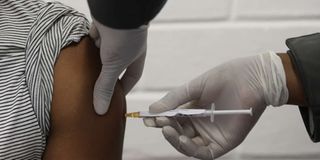Covid brought out our shame

One of the first South African Oxford vaccine trialists being injected with the clinical trial for a potential vaccine against the Covid-19 at the Baragwanath hospital in Soweto, South Africa, on June 24 ,2020.
What you need to know:
- As this week started, South Africa’s Covid-19 surge took its confirmed cases to more than 1 million.
- An alarmed President Cyril Ramaphosa on Monday evening spoke to his people.
This is how one of America’s leading newspapers, The Washington Post, reported this story recently: “About a week before Christmas, an 82-year-old Hispanic man sickened with the coronavirus leaned on his Catholic faith and began to pray in his Southern California hospital room.
“For reasons that remain unclear to authorities, this act angered his 37-year-old roommate, Jesse Martinez, who was also being treated for Covid-19 at Antelope Valley Hospital in Lancaster, Calif. Moments later on the morning of Dec. 17, Martinez allegedly grabbed an oxygen tank and bludgeoned the elderly man, according to the Los Angeles County Sheriff’s Department. The man died the next day, not from a virus that’s killed more than 325,000 Americans but from a fellow Covid patient in his own hospital room.”
The ravages of Covid-19 made 2020 that kind of year. Maybe Martinez, seeing the carnage the virus has caused around him, lost his faith, and thought God had forsaken us. It might have been too much for him to see the mzee bring this same God into the virus battle again.
His case might be extreme, but very many people have been driven over the cliff by Covid-19.
As this week started, South Africa’s Covid-19 surge took its confirmed cases to more than 1 million, by far the most of any country on the continent, fueled by a new variant of the virus that is more contagious.
An alarmed President Cyril Ramaphosa on Monday evening spoke to his people. With tears in his eyes, an emotional Ramaphosa said the country had dropped its guard and pleaded with South Africans to take care of themselves and comply with Covid-19 regulations.
He then announced a return to level 3 lockdown. Booze sales, indoor and outdoor social gatherings, have been banned again. Earlier curfew hours have been imposed, as has mandatory facemask wearing.
Part of the blame for how Covid-19 has played out in South Africa, as in many other places, goes to mistakes the government made, and corruption.
Kenya has its “Covid Millionaires”, and we’ve read reports claiming that possibly up to $400 million in Covid-19 funds and supplies disappeared in the first six months of the pandemic.
South Africa has gone one better. It has had such a frenzied coronavirus-related looting spree, its specialised crime unit is investigating suspected corrupt awarding of 658 government Covid-19 contracts worth over $343 million.
In September, a damning report into the use of its $26 billion Covid-19 relief fund, with a large chunk of it suspected to have been diverted to private pockets.
Behavior of citizens
However, Ramaphosa’s tears and pleas, also shine the light on something that hasn’t been explored much during the pandemic, but is a big issue; the role and behavior of citizens.
In South Africa, the government’s special Covid-19 relief grant attracted millions of applications, a record number of them fraudulent. For example, 8,000 applicants were found to be using personal details of dead people, while over three million were not in distress, and had another source of income.
In early December, Health Minister Zweli Mkhize blamed unruly student parties for the recent surge of infections. He particularly fingered a party in the south-eastern coastal town of Ballito that was attended by more than 1,500 recent school leavers for sparking a massive wave of infections.
Kenyan media regularly carry stories of the ploys citizens use to beat curfew and, before restrictions on bar operations were eased, to go round the alcohol sale rules. Six days ago, the Daily Nation, in a story, “Revealed: Revellers' tricks to beat curfew rules”, said: “As the world celebrates Christmas amid the Covid-19 pandemic, Kenyans have devised ways to drink well into curfew hours and avert police arrests.
“In Mombasa, the youth are booking hotels near bars and clubs, where they party well past the 10pm curfew time.”
Cybersecurity firm Kaspersky reported that spyware and cyberattacks skyrocketed this year, as Africans took to the internet to stay in touch with family and friends due to the Covid-19, and to work remotely. In January to August, alone, Kaspersky said, Kenyan users faced a record number malware attacks — around 14 million, and 41 million potentially unwanted applications (PUA) appearances.
The failures by governments, and in some cases the brutality of enforcement of lockdowns and curfews in the first months of the outbreak, in which security forces killed more people than the virus, led to a greater lost even more trust with the people.
For many, it tragically turned compliance with Covid-19 rules into an act of resistance against a malign state. For others, a selfishness born partly out of alienation, entrenched anti-social attitudes, and belief in the unscientific, drove their risky behaviour. Then some people socialised the crisis, stole back from the state, or “the system”.
When we finally take a good look at 2020 in the mirror, hopefully we shall have the courage to see some of the ugly truths about our ourselves. May 2021 bring out more of our better natures.
Mr Onyango-Obbo is a journalist, writer and curator of the “Wall of Great Africans”. @cobbo3





